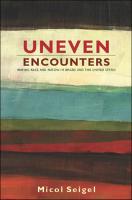Uneven Encounters
Making Race and Nation in Brazil and the United States
Author(s)
Seigel, Micol
Collection
Knowledge Unlatched (KU)Number
105140Language
EnglishAbstract
In Uneven Encounters, Micol Seigel chronicles the exchange of popular culture between Brazil and the United States in the years between the World Wars, and demonstrates how that exchange affected ideas of race and nation in both countries. From Americans interpreting advertisements for Brazilian coffee or dancing the Brazilian maxixe, to Rio musicians embracing the “foreign” qualities of jazz, Seigel traces a lively, cultural back and forth. Along the way, she shows how race and nation for both elites and non-elites are constructed together, and driven by global cultural and intellectual currents as well as local, regional, and national ones.
Seigel explores the circulation of images of Brazilian coffee and of maxixe in the United States during the period just after the imperial expansions of the early twentieth century. Exoticist interpretations structured North Americans’ paradoxical sense of themselves as productive “consumer citizens.” Some people, however, could not simply assume the privileges of citizenship. In their struggles against racism, Afro-descended citizens living in Rio de Janeiro, São Paulo, New York, and Chicago encountered images and notions of each other, and found them useful. Seigel introduces readers to cosmopolitan Afro-Brazilians and African Americans who rarely traveled far from home but who nonetheless absorbed ideas from abroad. She suggests that studies comparing U.S. and Brazilian racial identities as two distinct constructions are misconceived. Racial formation transcends national borders; attempts to understand it must do the same.
Keywords
History; United States; 20th Century; Social Science; Ethnic Studies; American; African American & Black Studies; History; Latin AmericaDOI
https://doi.org/10.1215/9780822392170ISBN
9781478090878Publisher
Duke University PressPublisher website
https://www.dukeupress.edu/Publication date and place
2009Grantor
Imprint
Duke University PressClassification
History of the Americas
Ethnic studies


 Download
Download